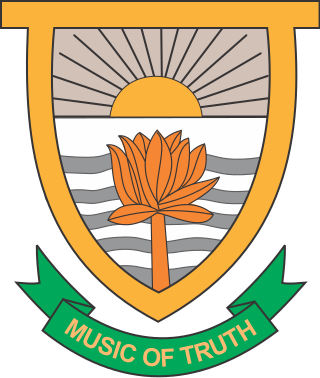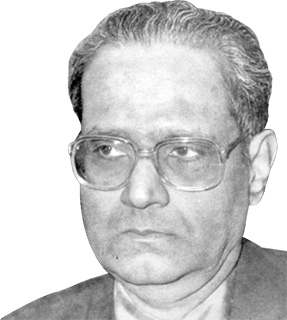Hinduism is an Indian religion or dharma, a religious and universal order or way of life by which followers abide. The word Hindu is an exonym, and while Hinduism has been called the oldest religion in the world, it has also been described as sanātana dharma, a modern usage, based on the belief that its origins lie beyond human history, as revealed in the Hindu texts. Another endonym for Hinduism is Vaidika dharma.

Hindus are people who religiously adhere to Hinduism. Historically, the term has also been used as a geographical, cultural, and later religious identifier for people living in the Indian subcontinent.

Sarvepalli Radhakrishnan was an Indian politician, philosopher and statesman who served as the second president of India from 1962 to 1967. He previously served as the first vice president of India from 1952 to 1962. He was the second ambassador of India to the Soviet Union from 1949 to 1952. He was also the fourth vice-chancellor of Banaras Hindu University from 1939 to 1948 and the second vice-chancellor of Andhra University from 1931 to 1936. Radhakrishnan is considered one of the most influential and distinguished 20th century scholars of comparative religion and philosophy, he held the King George V Chair of Mental and Moral Science at the University of Calcutta from 1921 to 1932 and Spalding Chair of Eastern Religion and Ethics at University of Oxford from 1936 to 1952.

Anna University is a public state university located in Chennai, Tamil Nadu, India. The main campus is in Guindy. It was originally established on 4 September 1978 and is named after C. N. Annadurai, the former Chief Minister of Tamil Nadu.

Ugadi or Yugadi, also known as Samvatsarādi, is New Year's Day according to the Hindu calendar and is celebrated in the states of Andhra Pradesh, Telangana, Karnataka and Goa in India. The cycle is actually consists of 60 years, each year individually named. The first day of each year called 'Ugadi'. The word Ugadi can be split into two, Uga means Course of stars and Adi means Starting. It is festively observed in these regions on the first day of the Hindu lunisolar calendar month of Chaitra. This typically falls in late March or early April of the Gregorian calendar. It also falls during the Tamil month of either Panguni or Chithrai, sometimes on the day after Amavasya with 27th Nakshatra Revati. Ugadi day is pivoted on the first New Moon after March Equinox.

Shaktism is one of the several major Hindu denominations wherein the metaphysical reality, or the godhead, is considered metaphorically to be a woman.

Wendy Doniger O'Flaherty is an American Indologist whose professional career has spanned five decades. A scholar of Sanskrit and Indian textual traditions, her major works include The Hindus: An Alternative History; Asceticism and Eroticism in the Mythology of Siva; Hindu Myths: A Sourcebook; The Origins of Evil in Hindu Mythology; Women, Androgynes, and Other Mythical Beasts; and The Rig Veda: An Anthology, 108 Hymns Translated from the Sanskrit. She is the Mircea Eliade Distinguished Service Professor of History of Religions at the University of Chicago, and has taught there since 1978. She served as president of the Association for Asian Studies in 1998.

Rajmohan Gandhi is an Indian biographer, historian, and research professor at the Center for South Asian and Middle Eastern Studies, University of Illinois at Urbana-Champaign, US. His paternal grandfather is Mahatma Gandhi, and his maternal grandfather is Chakravarthi Rajagopalachari. He is also a scholar in residence at the Indian Institute of Technology Gandhinagar.
The Oxford Centre for Hindu Studies, founded in 1997 and based in Oxford, England, is a research academy focused on the study and teaching of Hindu cultures of India and Nepal. It develops academic programmes of education, research and publishing in Hindu studies. It aims to encourage the Hindu community in the academic study of their own traditions and cultures. Till 2020, it functioned as a "recognised independent center" under the University of Oxford.

Hindu College is a constituent college of the University of Delhi in New Delhi, India. Founded in 1899, it is one of India’s oldest and most renowned colleges. It is ranked second best among colleges in India as per the latest National Institute Ranking Framework (NIRF). It offers undergraduate and postgraduate programmes in sciences, humanities, social sciences and commerce. It has also been awarded 'Star College' status for its Department of Biotechnology by the Ministry of Science and Technology.

The caste system in India is the paradigmatic ethnographic instance of social classification based on castes. It has its origins in ancient India, and was transformed by various ruling elites in medieval, early-modern, and modern India, especially in the aftermath of the collapse of the Mughal Empire and the establishment of the British Raj. It is today the basis of affirmative action programmes in India as enforced through its constitution. The caste system consists of two different concepts, varna and jati, which may be regarded as different levels of analysis of this system.

Dwaram Venkataswamy Naidu was one of the most important carnatic music violinists of the 20th century. Naidu was partially blind. He received the Sangeet Natak Akademi Award in Fine Arts in 1953. Government of India conferred on him the Padma Shri Award in 1957. Several members of his family are also notable Carnatic violinists.
Hindu studies is the study of the traditions and practices of the Indian subcontinent, and considered as a subfield of Indology. Beginning with British philology in the colonial period, Hindu studies has been practiced largely by Westerners, due in part to the lack of a distinct department for religion in Indian academia. Since the 1990s this has caused some dissent from Hindus, raising questions in academia about the role of Hindu studies in creating postcolonial images of India.
Thomas Blom Hansen is a Danish anthropologist and leading contemporary commentator on religious and political violence in India.
The Akhil Bharatiya Itihas Sankalan Yojana (ABISY) is a subsidiary of the Rashtriya Swayamsevak Sangh (RSS), a Hindu-nationalist organisation. Envisioned in 1973 by Moropant Pingley, a pracharak of the RSS, and founded in 1978-79, ABISY holds that India's history was distorted by the British Raj, and seeks to correct the biases. Scholars state that the actual aim of the organisation is to rewrite Indian history from a Hindu nationalist perspective.

Kotha Satchidananda Murty (1924-2011) was an Indian philosopher and professor. Murty served as the Professor of Philosophy, Andhra University, Visakhapatnam and Vice-Chancellor of Sri Venkateswara University, Tirupati in the state of Andhra Pradesh, South India. He specialized in Buddhist philosophy and contributed extensively to Mahayana Buddhism. His treatise on the teachings of Nagarjuna is well acclaimed.

Noboru Karashima was a Japanese historian, writer and Professor Emeritus in University of Tokyo, Japan. He also served as Professor Emeritus at the Taisho University, Japan. He was a prominent scholar of Asia in the studies of south Indian and South Asian histories. He has rewritten historical accounts on medieval south India and published a number of writings.
Meenakshi Jain is an Indian political scientist and historian who served as an associate professor of history at Gargi College, Delhi. In 2014, she was nominated as a member of the Indian Council of Historical Research by the Government of India. In 2020, she was conferred with the Padma Shri, India's fourth highest civilian award, for her work in the field of literature and education.

Kodethur Narasimha Udupa (1920–1992) was an Indian surgeon, medical administrator, a pioneer of integrative medicine and the founder director of the Institute of Medical Sciences, Banaras Hindu University (BHU). Born in Udupi in the South Indian state of Karnataka, His father was Tamayya Udupa scholar in Sanskrit and Jyotish belonging to Shivalli brahmin community. He passed his bachelor's degree in Ayurvedic Medicine (AMS) from Banares Hindu University, secured his master's degree (MS) from the University of Michigan in 1948 and passed FRCS examination from Canada.
Ram Harsh Singh is an Indian practitioner of the Ayurveda system of alternative medicine and the founder vice chancellor of Dr. Sarvepalli Radhakrishnan Rajasthan Ayurved University. An Emeritus Professor of Banaras Hindu University and a National Professor of the Ministry of AYUSH of the Government of India, he was conferred with the fourth highest civilian honour of Padma Shri, in 2016.













